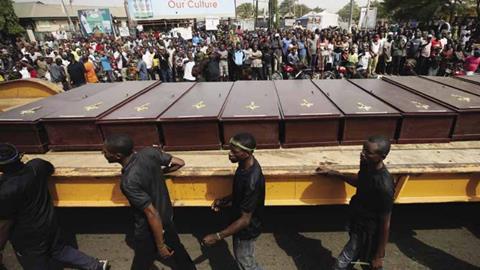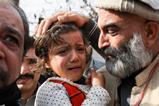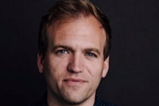A slow-motion and largely ignored war is taking place in Africa’s most populous nation, and time is running out, says Rev Johnnie Moore
Africa is a continent that takes up much of our globe but still too little of our minds. Except in times of tragedy, it seems.
Consider how HIV/AIDS wiped out 15 million Africans, or how Ebola killed thousands, or how genocide resulted in the murder of as many as 1 million Rwandans. As coronavirus has shown us: disease, carnage and death can be ignored until the cost of human life becomes too unbearable, or until it comes to Western shores.
Unfortunately, our eyes are being drawn again to tragedy in Africa, and once again, the stakes are high.
HORROR AND TERROR
Nigeria should be Africa’s crown jewel. It’s the continent’s most populated country, with just over 200 million people, and it has its largest economy. It is a country rich with oil – the tenth largest oil reserve in the world – but poor in governance. It is also a divided nation, with Islam being the dominant religion in the north and Christianity in the south. Its irresistibly rich resources have previously been its demise. Colonial powers exploited it. Postcolonial leaders corrupted it. Now terrorists are destroying it – usually, beginning with its Christians.
As one of France’s most prominent intellectuals, Bernard-Henri Levy, wrote in The Wall Street Journal: “A slow-motion war is under way in Africa’s most populous country. It’s a massacre of Christians, massive in scale and horrific in brutality. And the world has hardly noticed.”
MURDERING THE INNOCENT
Patience was 13. Revelation was six. Rejoice was four. They are the names of three of the youngest victims of the Christian massacre unfolding in Nigeria. They weren’t the only young victims in their village during the same attack in early 2020. The terrorists killed at least 20 as they went from house to house yelling “Allahu Akbar” along the way. They also put a bullet in the head of a three-month-old and hacked a six-year-old to death. We don’t know the names of those children. We do know the name of a 14-year-old girl who was murdered along with her grandparents. Her name was Blessing.
IT’S A MASSACRE OF CHRISTIANS, MASSIVE IN SCALE AND HORRIFIC IN BRUTALITY
This horror wasn’t even the work of the infamous Boko Haram insurgents who have long terrorised Nigeria’s north-east. These massacres came at the hands of a group of radicalised Fulani tribesmen who, profanely inspired by Boko Haram and the Islamic State (IS), have been summarily executing Christians in the centre of Nigeria and not far from the country’s capital, Abuja, at a pace that has exceeded Boko Haram.
One of those Christians was Michael Nnadi. Michael was studying at Good Shepherd Seminary in Kaduna State on the main highway to Abuja. On the evening of 8 January 2020 his world was upended when an armed gang, disguised in military fatigues, breached the gate of the school. They snagged four seminarians, including Michael, and made their escape.
Local authorities attributed the kidnappings to criminal activity by bandits whose interest was in whatever they could extort from the Catholic Church, or the relatives of the four seminarians. By the end of the month, three of the four boys had been freed, but not Michael. A few days later he was found dead, his body dumped on the side of a road by his kidnappers.
Why Michael was singled out for death was a mystery to his family and the seminary until 30 April 2020. That’s when Michael’s murderer, Mustapha Mohammed, was interviewed by Nigeria’s Daily Sun newspaper. The gang leader said the group took five days to survey the property, then attacked. The paper reported that Mohammad was bothered by Michael’s insistence and determination in preaching the gospel. He didn’t like the confident faith that was being displayed. And for that reason, Mohammed killed Michael.
FULANI TRIBESMEN
Because the Nigerian government has failed again and again to show the political will to oppose and destroy the terrorist insurgency in the north-east of the country, it now faces a second front with radicalised Fulani militants in the Middle Belt increasingly appropriating the terrorist tactics of Boko Haram and IS as they torture Christians and their communities.
When Rabbi Abraham Cooper, of the famed Simon Wiesenthal Center, and I visited Nigeria on a fact-finding mission last year we met a nine-year old girl who told us about watching Fulani terrorists murder her parents and siblings with machetes.
Then there was a pastor whose church had been set alight twice. He met with us soon after negotiating the release of two female parishioners kidnapped by terrorists while en route to a Christmas celebration in 2019. The young women, newly released, stood next to him, still showing signs of shock. They recounted how the terrorists had captured them at their ‘checkpoint’ within earshot of a state police outpost. One of the young women was clever enough to keep her phone on and concealed. It allowed the local authorities to locate them. Yet government troops who came within visual distance of the girls chose not to rescue them, so the woman’s courageous pastor took the situation into his own hands. He began to communicate with the terrorists. The ransom demanded was a fortune for any individual in his modest town. So he sold virtually all his possessions, as did other church members, to pay the $1,000 required to save their lives. Risking his own life, he drove to the designated place for the exchange in the hope that the terrorists would fulfil the agreement they had reached; mercifully, they did.
Other stories don’t end so happily. We met men from a village razed by the Islamists. We were expecting to speak with a representative of the community, but instead the entire village showed up in our hotel room. Their families had been massacred; their livelihoods sabotaged. The attackers waited until the middle of the night before assailing men, women and children with guns and machetes. Kidnapping wasn’t to their taste. They started fires, then unleashed horrific ethnic cleansing.
LEAH SHARIBU
Of course, one victim has emerged as a symbol of all the suffering – our dear Leah Sharibu, the Christian teenager who was 14 when, in an act of heroic faith, she very publicly refused to convert to Islam despite the threats from her blood-soaked terrorist captors. Her whereabouts and health is still unknown because of that decision.
I’ll never forget sitting with Leah’s mum as she recounted that terrible moment when she was waiting with the mothers of the other 100 or so victims. One by one their daughters came, but Leah was nowhere in sight. Finally, Mrs Sharibu saw Leah’s friend. “Where’s Leah?” she asked her. That’s when she found out her daughter wasn’t among those for whom the government had secured release. Leah was the only one who wasn’t freed, because she refused to convert to Islam.
There have been at least 63,000 victims of Boko Haram and the Fulani since 2000 according to Stephen Enada, executive president of the International Committee of Nigeria. There have probably been even more breathing their last in the shadows of history, unknown to the world. Thousands of churches have been torched, scores of children slaughtered, countless women enslaved, pastors have been beheaded and Christian homes have been set ablaze. To put it simply: there are tens of thousands of Leah Sharibus. It is a slow-motion war and the victims are mainly Christian, with the terrorists determined to also kill or extort every single Muslim who attempts to stand in their way.
WE MET A NINE YEAR-OLD GIRL WHO TOLD US ABOUT WATCHING FULANI TERRORISTS MURDER HER PARENTS AND SIBLINGS WITH MACHETES
TIME IS RUNNING OUT
The situation in Nigeria is out of control and it cannot be neglected any longer. Nigeria has a human rights problem, a religious freedom problem and problems linked to the exploitation of natural resources, crime and poverty. If nothing is done, Christians will not be the last victims, for no person of faith – Christian, Muslim, Hindu, Jew – or of no faith will be spared the ravages of deluded terrorists who believe that their mission of death is a service to God.
In December, Nigeria received some well-deserved tough love from the United States – its loyal ally. Secretary of State Mike Pompeo made the decision to add the nation to the State Department’s annual list of the world’s most heinous violators of religious freedom. Nigeria now has the unfortunate distinction of, being, along with India, the only two secular democracies ever added to the infamous list. The country will be listed alongside Iran, China and North Korea. That’s because, like those countries, and others like them, Nigeria is either unwilling or incapable of providing this fundamental human right to its citizens.
It is an astonishing indictment, and a direct signal that the patience long reserved by the United States for its great African friend is wearing thin. It also demonstrates a change in public opinion in the United States as Americans will no longer sit idly by as reports and images from almost daily atrocities flood their social media feeds.
Millions of Americans are asking why the United States is sending £1bn in taxpayer’s money annually to a country where this is happening? The British government should follow suit with similar warnings to its friend and ally. After all, the British taxpayer gives £800,000 a day to Nigeria.
NIGERIA’S RESPONSE
In response, there are many things the Nigerians can do. They can start by calling terrorism by its name, whether or not it is perpetrated by Boko Haram, IS or by a small subgroup of radicalised Fulani tribesmen – the tribe of Nigerian President Buhari himself. They can start ensuring religious communities are protected and that perpetrators of terrorism, or other criminal activity (or those who enable them) are prosecuted to the fullest extent of the law. Nigeria must also, once and for all, root out the endemic corruption that weaves itself in and out of Nigerian society and provides opportunities and incentives for terrorists and other criminals to continue their trade. The military can start utilising the training it has received from the British and Americans, and the Nigerian government can diversify its leadership, which Christians say is dominated by northern Muslims. If these compounding problems aren’t dealt with then we could see a catastrophe beyond comprehension.
A failing Nigerian state would cause the failure of all of western Africa. If only five per cent of Nigeria’s massive young population is drawn to support terrorism of various kinds, for whatever the reason, it would make the Islamist threats radiating from the Middle East seem like child’s play. That, in turn, could create a refugee crisis more acute than the one triggered by the Syrian conflict. The world could find itself managing a dangerous brew of Islamist terrorism, intensified by ethnic distrust, all ripe for exploitation by malign actors like the Iranian regime. The countries surrounding Nigeria are already dealing with similar Islamist insurgencies as it is.
The fact is that the present and pitiful condition in the country represents a foreign policy failure by everyone. As one of Nigeria’s most influential Christian leaders put it to me: “Yesterday was the best day to act.” In a separate meeting, one of the country’s most prominent Imams said virtually the same. They are right. Time is running out.
WHAT SHOULD CHRISTIANS DO?
Christians have a special obligation to our suffering brothers and sisters in Nigeria. We should find ourselves inspired by their faith, and we should tell their stories in our churches and to our families. These are believers drawn straight from the pages of the New Testament who are very willing to die for a faith we are often barely willing to live for.
WE SHOULD PRAY THE WAY WE HOPE SOMEONE WOULD PRAY FOR US IF WE WERE IN THAT SITUATION
The word of God tells us that we are to “mourn with those who mourn” (Romans 12:15). It tells us that we are to remember those persecuted as if we were there with them (Hebrew 13:3), and we are to pray that they are “delivered from wicked and evil people” (2 Thessalonians 3:2). Simply put, we should pray the way we hope someone would pray for us if we were in that situation. We should give generously, the way we hope someone would give to us, and we should be an advocate the way we hope someone would be ours. We must do it with all our might even as we are rebuilding our own lives after this terrible pandemic. As one pastor recently told the Nigeria press, leaning against his torched Christian school: “This issue of Covid-19: we don’t know anything about it; our problem is Fulani who keep killing us.”







































